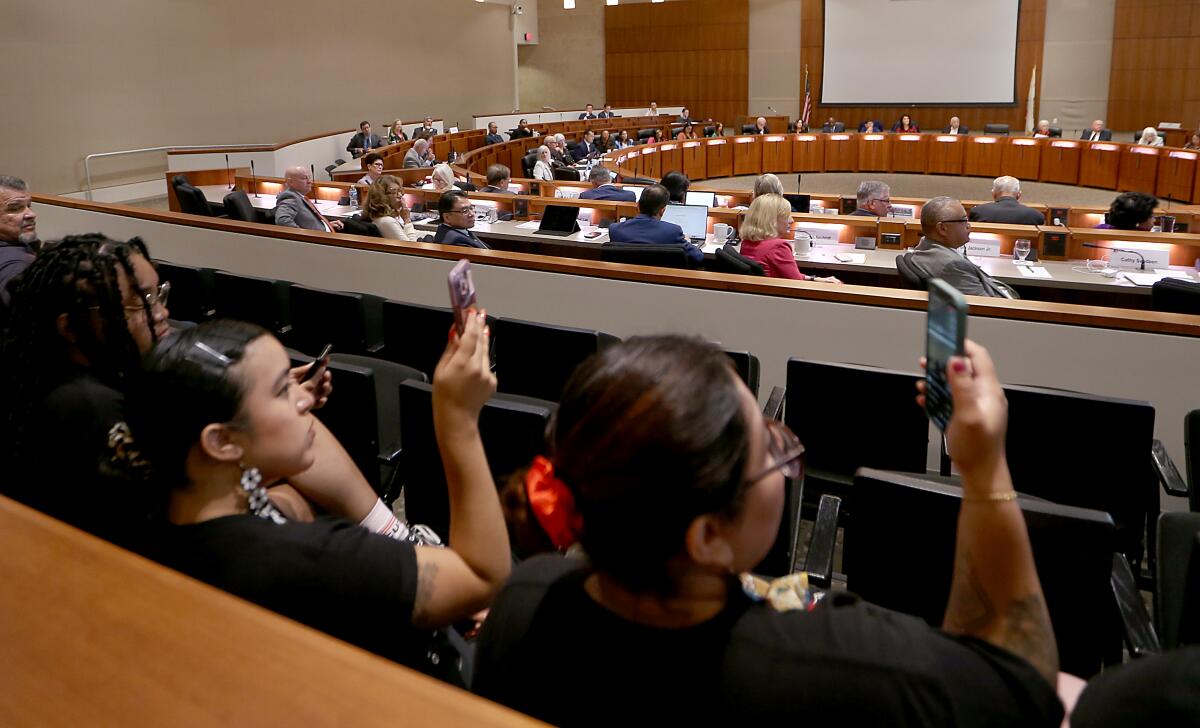CSU stands by a 6% tuition hike plan, but backs down from a key provision ahead of vote

- Share via
The California State University system is sticking with its controversial 6% tuition increase proposal, but would limit it to five consecutive years, backing down from an earlier plan that called for annual tuition hikes to go on indefinitely.
The current proposal preserves the 6% annual increase proposed earlier this year, but sets a firm end date in the 2028-2029 year, at which point the Board of Trustees would determine if further increases are necessary. The system made the change after multiple trustees and student groups pushed back on an earlier version that would have allowed the system to raise tuition annually without end.
Trustees are scheduled to vote on the increase, which would begin fall 2024, at next Wednesday’s meeting. The increase is projected to raise an extra $148 million in the first year of the plan, and $840 million by the last.
Several large student groups, the Cal State Faculty Assn. and some trustees, including Eleni Kounalakis, the state’s lieutenant governor, have said the increase will create a burden for students already struggling to pay rent and other basic necessities. Campus leaders say many students are not aware of the proposed hikes and administrators have not done enough to communicate with them about such a critical issue.
Cal State officials say the increases are urgently needed to help cover a $1.5 billion budget gap across the 23-campus system. A report released in May found that Cal State covered only about 85% of what it cost to actually meet needs for student services, academic support, instruction and other expenses in the 2021-22 academic year.
Overall graduation rates have increased, but persistent equity gaps among racial groups remain. ‘Not all students are being lifted equally by the tide,’ the report’s principal author said.
“What we’ve had to do is make very difficult decisions and trade-offs by making pretty serious cuts in expenditures in order to make ends meet,” said Steve Relyea, executive vice chancellor and chief financial officer during a media call on Wednesday.
Administrators have had to forgo building renovations and wage increases to pay for other expenses. And the gap could widen if the system doesn’t raise more money soon, potentially worsening campus experiences of students.
“If we don’t do something like this, it will be the students who suffer most because we won’t be able to have the classes, the course sections, the student support — all the things that the students need to have a high quality education,” Relyea said.
Under the proposal, full-time undergraduate tuition would increase by $342 per student to $6,084 in the 2024-25 year. By 2028-2029, tuition would increase to $7,682.
The trustees would assess the effect of the increases at least a year and half before they are scheduled to end, and decide if additional tuition hikes are warranted, according to the system.
Cal State officials say they are committed to maintaining college affordability — the system increased tuition just once in the last 11 years, despite rising costs because of inflation.
Newly appointed Cal State Chancellor Mildred García discussed her early plans for tackling some of the system’s most urgent issues: a 1.5 billion budget gap, flaws in handling sexual misconduct, declining enrollment.
About 60% of the system’s 460,000 students who have their full tuition covered through grants, scholarships and waivers will continue to have their costs covered, officials said. And over five years, the system plans to earmark $280 million of the money raised from tuition increases for financial aid.
Several trustees have acknowledged the need to create more financial stability in the system by raising tuition. But others, including Kounalakis, have questioned it.
“We’ve heard about this notion that this will only affect 40% of our student body — $840 million raised in five years, put on the backs of 40% of our students,” said Kounalakis at the July trustees meeting. “How can we possibly contemplate that kind of money, while we are talking about students who we know are not wealthy?”
Kounalakis also urged the trustees to delay the vote until after September, when more students have had time to consider the proposal.
The tuition hikes have also drawn opposition from the Cal State Faculty Assn., which represents the system’s 29,000 professors, lecturers, librarians and counselors, and the Cal State Student Assn., which represents the system’s 460,000 students.
Students for Quality Education, a progressive grassroots organization, is holding a series of demonstrations across the system’s campuses this week to protest the tuition proposal. At Cal State Long Beach, student activists have passed out fliers and held information sessions outside the campus bookstore to inform their peers of the proposal.
Luis Ortiz, a third-year student, said many of the students he’s approached were unaware the system was considering a tuition increase. He said the system has not done enough to alert students to the possibility of a hike.
He said increasing tuition will only make it harder for Black and brown students from low income families, students the system prides itself on serving, to access higher education.
“It’s a bunch of false promises by the CSU. They want to be equitable, they want to be diverse … this throws a wrench in all of that,” he said. “Makes it worse, makes it more inaccessible.”
More to Read
Sign up for Essential California
The most important California stories and recommendations in your inbox every morning.
You may occasionally receive promotional content from the Los Angeles Times.
















